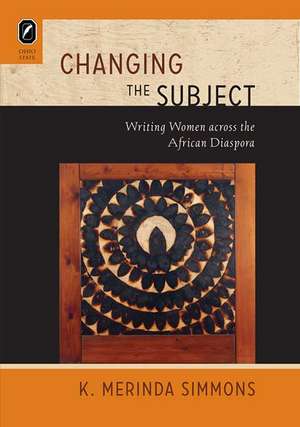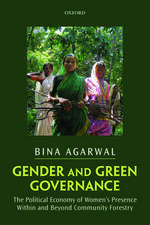Changing the Subject: Writing Women across the African Diaspora
Autor K. Merinda Simmonsen Limba Engleză Paperback – 31 mai 2016
In Changing the Subject: Writing Women across the African Diaspora, K. Merinda Simmons argues that, in first-person narratives about women of color, contexts of migration illuminate constructions of gender and labor. These constructions and migrations suggest that the oft-employed notion of “authenticity” is not as useful a classification as many feminist and postcolonial scholars have assumed. Instead of relying on so-called authentic feminist journeys and heroines for her analysis, Simmons calls for a self-reflexive scholarship that takes seriously the scholar’s own role in constructing the subject.
The starting point for this study is the nineteenth-century Caribbean narrative The History of Mary Prince (1831). Simmons puts Prince’s narrative in conversation with three twentieth-century novels: Zora Neale Hurston’s Their Eyes Were Watching God, Gloria Naylor’s Mama Day, and Maryse Condé’s I, Tituba, Black Witch of Salem. She incorporates autobiography theory to shift the critical focus from the object of study—slave histories—to the ways people talk about those histories and to the guiding interests of such discourses. In its reframing of women’s migration narratives, Simmons’s study unsettles theoretical certainties and disturbs the very notion of a cohesive diaspora.
The starting point for this study is the nineteenth-century Caribbean narrative The History of Mary Prince (1831). Simmons puts Prince’s narrative in conversation with three twentieth-century novels: Zora Neale Hurston’s Their Eyes Were Watching God, Gloria Naylor’s Mama Day, and Maryse Condé’s I, Tituba, Black Witch of Salem. She incorporates autobiography theory to shift the critical focus from the object of study—slave histories—to the ways people talk about those histories and to the guiding interests of such discourses. In its reframing of women’s migration narratives, Simmons’s study unsettles theoretical certainties and disturbs the very notion of a cohesive diaspora.
Preț: 253.89 lei
Nou
Puncte Express: 381
Preț estimativ în valută:
48.58€ • 50.86$ • 40.20£
48.58€ • 50.86$ • 40.20£
Carte tipărită la comandă
Livrare economică 02-08 aprilie
Preluare comenzi: 021 569.72.76
Specificații
ISBN-13: 9780814252925
ISBN-10: 0814252923
Pagini: 186
Dimensiuni: 152 x 229 x 15 mm
Greutate: 0.28 kg
Ediția:1
Editura: Ohio State University Press
Colecția Ohio State University Press
ISBN-10: 0814252923
Pagini: 186
Dimensiuni: 152 x 229 x 15 mm
Greutate: 0.28 kg
Ediția:1
Editura: Ohio State University Press
Colecția Ohio State University Press
Recenzii
“K. Merinda Simmons’s formalist critical readings of famous women of the Diaspora are perceptive, refreshing, insightful, and destined for notoriety and a successful critical life. One of the most intriguing claims she advances is that the experience of migration had an indelible impact on the ways in which gender, class, and subject positions were defined. Her original analyses of the relation between these categories and geographic locations offer a distinctive analytic resource for the rich enhancement of studies of a Newly Configured Diaspora; literature and religion; and black women’s writing.” —Houston A. Baker, Distinguished University Professor and professor of English at Vanderbilt University
Notă biografică
K. Merinda Simmons is assistant professor of religious studies at the University of Alabama.
Cuprins
Introduction––When Literature and Identity “Get Real"
Chapter 1––Sites of Authentication: Migration and Subjectivity in The History of Mary Prince
Chapter 2––“Different with Every Shore”: Women, Workers, and theTransatlantic South in Their Eyes Were Watching God
Chapter 3––Familiar Ground: The Rhetoric of “Realness” in Mama Day
Chapter 4––“Recuperating” the Subject in I, Tituba, Black Witch of Salem
Conclusion––Writing Women across the African Diaspora
Chapter 1––Sites of Authentication: Migration and Subjectivity in The History of Mary Prince
Chapter 2––“Different with Every Shore”: Women, Workers, and theTransatlantic South in Their Eyes Were Watching God
Chapter 3––Familiar Ground: The Rhetoric of “Realness” in Mama Day
Chapter 4––“Recuperating” the Subject in I, Tituba, Black Witch of Salem
Conclusion––Writing Women across the African Diaspora
Descriere
Argues that, in first-person narratives about women of color, contexts of migration illuminate constructions of gender and labor.











